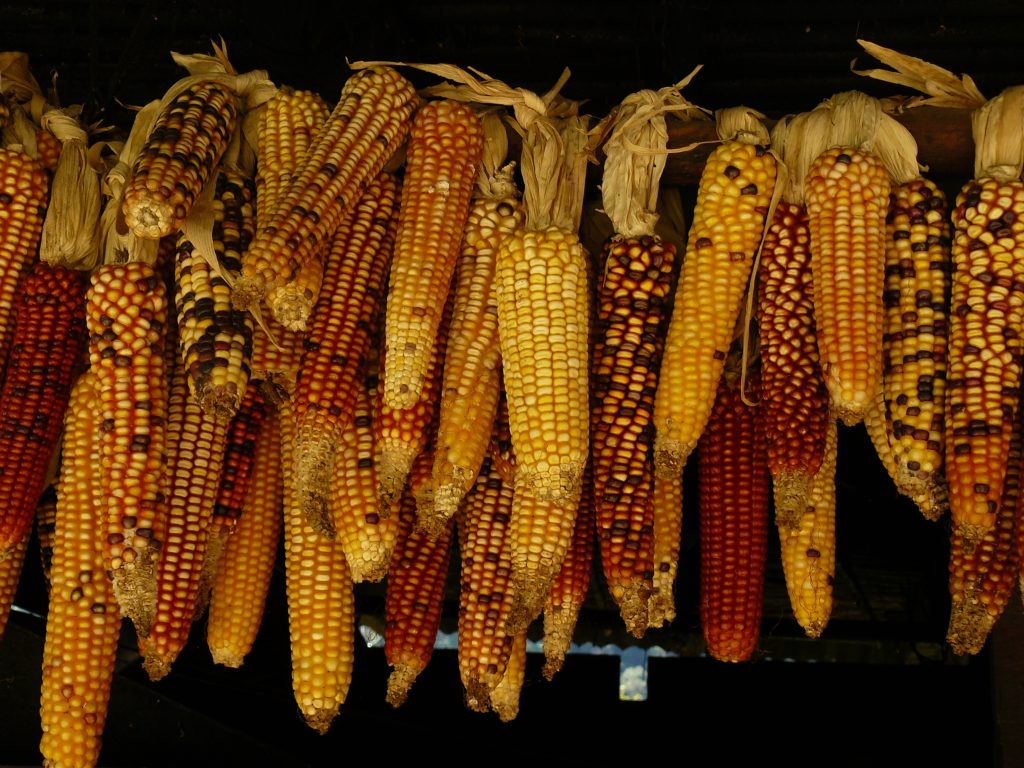
Here’s my annual Thanksgiving post.
Photo credit: Wikimedia
"If the Bible is true, then none of our fears are legitimate, none of our frustrations are permanent, and none of our opposition is significant."
by Dan Olinger

Here’s my annual Thanksgiving post.
Even in tumultuous times, we have much to be thankful for.
Photo credit: Wikimedia

Part 1: Introduction | Part 2: Acknowledging the Divide | Part 3: “Great Is Diana!” | Part 4: Letting Hate Drive | Part 5: Pants on Fire | Part 6: Turning Toward the Light | Part 7: Breaking Down the Walls | Part 8: Beyond Tolerance | Part 9: Love | Part 10: Peace | Part 11: Encouragement
Whatever you do in word or deed, do all in the name of the Lord Jesus, giving thanks through Him to God the Father (Col 3.17).
It’s no accident that we come to the end of this relatively lengthy series two days after the US presidential election. Now, regardless of the election’s eventual outcome, it falls to us to decide how to respond to its results—to decide whether we’re going to live in peace with our so-recent political opponents, whether we’re the “winners” or the “losers.”
Paul concludes the passage we’ve been studying with a call to thankfulness, or gratitude. Everything we do, he says, should be done for Christ and in gratitude through him to the Father.
I’ve written on this idea before. And so has Paul. Have you noticed that three of his four admonitions in this paragraph include thanksgiving?
This is a pervasive concept in biblical thinking. God has been unimaginably good to us—so good, in fact, that literally everything evil about the world pales in comparison.
What do you have to be thankful for?
No matter who is president of the US, or which party controls the Senate or the House of Representatives or the Governor’s Mansion or the County Council or the Mayor’s Office,
There’s not a government or official in all the history of all the universe who can negate or even endanger any of that, or who can compete with that for any of my confidence or my fear.
God is great. God is good.
Let us thank him.
And let us live out that gratitude with a confidence and joy and grace that makes even our “enemies”—who are, when all is said and done, our fellow images of God and the ordered objects of our grace—to be at peace with us (Pr 16.7).
Photo by Jens Lelie on Unsplash
Since I post on Mondays and Thursdays, I’ll always be posting on Thanksgiving Day in the US.
I wrote a post about thankfulness on July 27, 2017, and I think I’m going to post it every Thanksgiving.
It’s here.
Today would have been my father’s 100th birthday. He lived only (?!) to the age of 90, but he had a really interesting life—railroad conductor, printer, pilot, kinda travel agent, small business owner. He was never boring. Scary maybe, but never boring.
The thing that I find really remarkable about his life is the amount of change he saw.
He was born on the frontier. His father, after the murder of his own father, headed west from Missouri looking for opportunity. Eventually he homesteaded—that Homestead Act was a real boon to upward mobility—just below the Continental Divide outside Salmon, Idaho, on land that no one had ever tamed before, and he and his wife and 11 children worked like oxen to make a living for themselves.
And here’s the thing. They lived, in 1918, pretty much the same way people lived in Abraham’s day. They built their own houses by hand, carried water in from the creek, fended off the darkness with oil lamps, powered their farming with animals, and did their excretory business in a hole in the ground. Oh, eventually they got electricity, and my grandfather even bought a car before it was all over, but when Dad was born, the routine of daily life hadn’t changed much for 4000 years.
Dad’s mother died when he was 7, and his father when he was 13, and from then on he was raised relatively haphazardly by a series of older siblings as they were able. Graduated from high school a year or two late, eventually served his country in World War II—as part of the greatest generation—and came home to work with his hands to scrape together a thousand bucks or two every year to feed the wife and three kids. Leave it to Beaver, indeed.
Not well educated, but a constant reader, he created a fully organic subsistence farm, before hardly anybody was even talking about such things, on a mere two acres of land in (really) Greenacres, Washington, then piled the whole family into a Rambler station wagon and a ’54 Nash to move clear across the country for a white-collar job. (No, my name’s not Joad.)
After they finally got the kids out of the house, he and Mom retired to southern New Mexico, where within a few short years Mom died and he was left pretty much alone with his tool-sharpening shop. After he’d spent 25 years there, an ER doctor called me from New Mexico and said, “You need to come get your Dad.”
And for the last 6 years of his life, as his well-used but well-worn mind slowly ebbed, I cared for him as he needed it, but left him his independence as much as I thought was safe.
And one evening the two of us sat together at my computer, fired up Google Earth, and went back to Salmon. He guided me up the Salmon River to Baker, where he went to school (yep, on horseback, in the snow) and then north up Sandy Creek to the old homestead. It was right here, on the west side, he said. And I dropped the perspective as low as I could, and we stood on the old land and looked up Sandy Creek to the Divide, where he’d hiked over into Montana one time when he was a teen and got upset with somebody.
In one lifetime, he went from the days of Abraham to Web-based virtual reality on a laptop. In one lifetime, his life changed in pretty much all the ways that the world has changed since it began.
What a time to be alive.
Dad didn’t make it to 100—here, anyway—and I’m confident that he wouldn’t have wanted to. But what a life he had, and what lives he has left behind. Sons and daughters who have all known success, all in remarkably different ways. Two grandsons who are Service Academy graduates, and two granddaughters with great abilities and extensive experiences around the world.
And life, for him, goes on, in a way that I don’t have the experience to describe.
Hallelujah.
Photo by Ember + Ivory on Unsplash
When I was a boy, my Dad worked for a politically conservative speaker’s bureau. As a result, I got to meet a lot of interesting people when they came to town to give a speech. There was Gen. Robert Scott, WW2 fighter pilot and author of the book God Is My Co-Pilot, who sat at our dinner table and told wonderful story after wonderful story. There was Maj. Pedro Diaz Lanz, compatriot of Fidel Castro and chief of the Cuban Air Force, who defected and told horrific stories of repression in Cuba. There was Slobodan Draskovich, who hijacked a commercial flight to get out of Communist Yugoslavia, and who thought the wire leading to the electric blanket in our guest bedroom was evidence that someone was trying to kill him.
But my favorite was Hilaire du Berrier, a farm boy from North Dakota who was expelled by Pillsbury Military Academy (later the campus of Pillsbury Baptist Bible College) a month before graduation and eventually ran off to be a soldier of fortune. He fought against the Fascists in Ethiopia and spied against the Communists in the Spanish Civil War, then spied against the Japanese in Shanghai during their occupation of China. (As part of his cover he rented a room to a woman who later became one of Mao’s wives and was eventually disgraced as leader of the Gang of Four.) Eventually captured by the Japanese, he bore the scars of torture during their interrogation.
In short, he had a lot of stories to tell.
In town for a speaking engagement, he stayed at our house for 3 days in the spring of ’63.
I was a hyperactive kid, a complete pain in the neck.
He took an interest in me.
He showed me how to make a different kind of paper airplane. He told me stories about his idol, Napoleon. (Hilaire’s real name was Harold; he changed it to Hilaire in honor of one of Napoleon’s generals.) He took me to an office-supply store and showed me where they sold liquid rubber, the kind you use to make tear-off pads of paper. It was pink and had a distinctly pungent smell. He showed me that you could take a 3-dimensional object—he had a metal eagle that he’d gotten off a Napoleonic dispatch case, and why he had it with him on that trip, I’ll never know—and cover it with several layers of liquid rubber to make a mold. Then he showed me how to mix plaster of paris (is that French?), pour it into the mold, insert a wire in the back, and make an exact copy of the object, paint it (with gold paint!), and yield a pretty cool wall plaque. He took a little plaque I already had, with the Cub Scout oath on it, and we made a copy of that too.
I was a lot older when I realized that he had been teaching me spycraft.
He had a lady friend in our town—she was the host of the local Romper Room show—and incited me to come along on a dinner date to act as escort for her daughter. He instructed and rehearsed me to present my “date”—I was 8—with one of our cool gold-painted plaster eagles and induct her into the Society of Napoleon. We had a fabulous time at a fancy restaurant in Spokane. (In those days, there weren’t a lot of those.)
Hilaire was an artist as well; he’d done commercial art in Chicago before running off to chase adventure. He told me I should write a book; he laid out a characterization for me, presenting each of my family members as an interesting animal: Mel Mouse, Pauline Pony, Betty Jeanne Jackrabbit (though he misspelled her name), Kathy Cat, and, of course, Danny Dog. I should write The Story of Danny Dog and His Friends, he told me, and he said he would wait expectantly for me to send him a copy when it was published.
A few days later, having returned from the speaking tour to his apartment in New York, he wrote me a letter to let me know he was still thinking about me, and to encourage me to get to work on The Book.
He lived another 40 years, writing an international intelligence subscription letter called HduB Reports, eventually dying in his 90s, a tax exile in Monaco.
I’ve never forgotten the time he took during those 3 days to reach out to a painfully energetic boy, giving his attention to a kid who needed direction, planting ideas in me that I have gone back to as an adult and that I remember well now more than 50 years later.
Thank you, Hilaire. I’m grateful.
